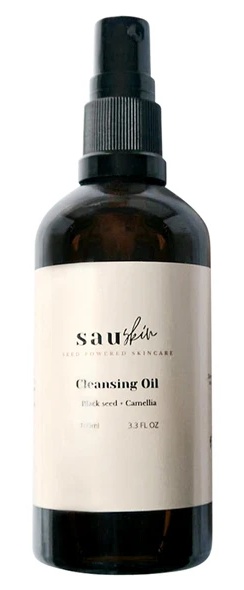
Cleansing Oil
Highlights
Skim through
| Ingredient name | what-it-does | irr., com. | ID-Rating |
|---|---|---|---|
| Polysorbate 80 (Vegetable Derived Emulsifier) | emulsifying, surfactant/cleansing | 0, 0 | |
| Simmondsia Chinensis (Jojoba Oil) | emollient | 0, 0-2 | goodie |
| Nigella Sativa (Black Seed Oil) | soothing, antioxidant, emollient, perfuming | goodie | |
| Adansonia Digitata (Baobab Oil) | |||
| Punica Granatum (Pomegranate Seed Oil) | |||
| Camellia Japonica Oil (Camellia Oil) | emollient | ||
| Tocopherol (Vitamin E) | antioxidant | 0-3, 0-3 | goodie |
SauSkin Cleansing OilIngredients explained
A common little helper ingredient that helps water and oil to mix together, aka emulsifier.
The number at the end refers to the oil-loving part and the bigger the number the more emulsifying power it has. 20 is a weak emulsifier, rather called solubilizer used commonly in toners while 60 and 80 are more common in serums and creams.
Jojoba is a drought resistant evergreen shrub native to South-western North America. It's known and grown for jojoba oil, the golden yellow liquid coming from the seeds (about 50% of the weight of the seeds will be oil).
At first glance, it seems like your average emollient plant oil: it looks like an oil and it's nourishing and moisturizing to the skin but if we dig a bit deeper, it turns out that jojoba oil is really special and unique: technically - or rather chemically - it's not an oil but a wax ester (and calling it an oil is kind of sloppy).
The (fixed or non-volatile) oil coming from the black seeds of Nigella Sativa, a smallish (20-30 cm) flowering plant native to Southwest Asia. The seed has a very complex chemical composition (it contains both fixed and volatile oil) and is used traditionally for a bunch of "anti-something" abilities including antitumor, antidiabetic, antihistaminic, anti-inflammatory, and antimicrobial properties. In Islam, black cumin seed was considered "a healing seed for all diseases except death”.
As for modern research and chemical composition, the fixed oil from the seeds is rich in skin-nourishing unsaturated fatty acids (mainly linoleic acid at 50 – 60% and oleic acid at 20%, but also contains some rare ones like C20:2 arachidic and eicosadienoic acids), amino acids, vitamins, and minerals. A component called thymoquinone (it's the main component of the volatile oil part, but the fixed oil also contains some) is considered to give the seed its main therapeutic properties including strong antioxidant and anti-inflammatory abilities.



- Primary fat-soluble antioxidant in our skin
- Significant photoprotection against UVB rays
- Vit C + Vit E work in synergy and provide great photoprotection
- Has emollient properties
- Easy to formulate, stable and relatively inexpensive
You may also want to take a look at...
| what‑it‑does | emulsifying | surfactant/cleansing |
| irritancy, com. | 0, 0 |
| what‑it‑does | emollient |
| irritancy, com. | 0, 0-2 |
| what‑it‑does | soothing | antioxidant | emollient | perfuming |
| what‑it‑does | emollient |
| what‑it‑does | antioxidant |
| irritancy, com. | 0-3, 0-3 |





